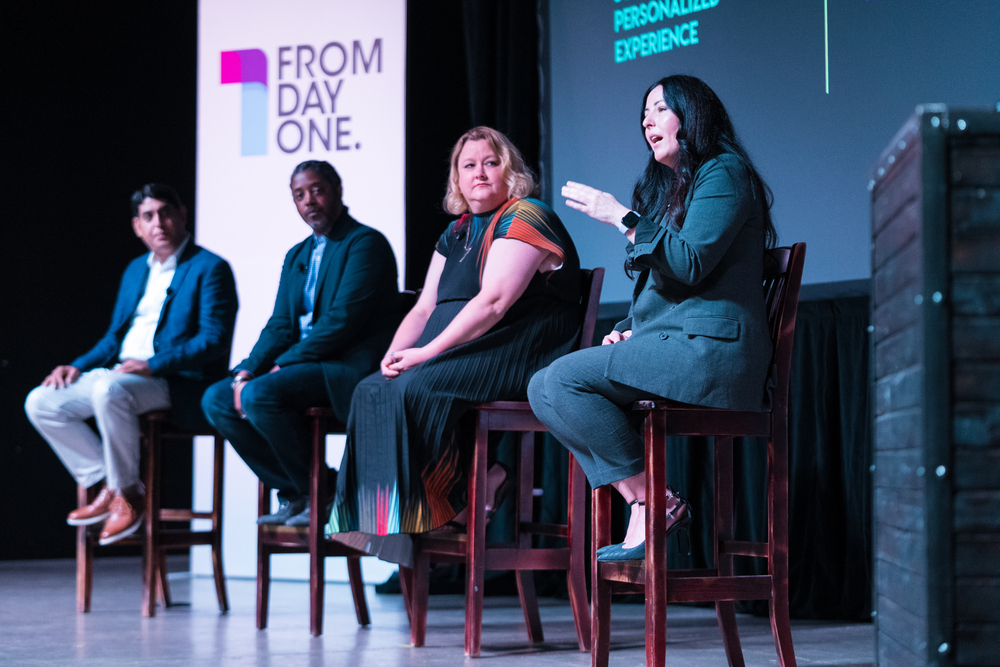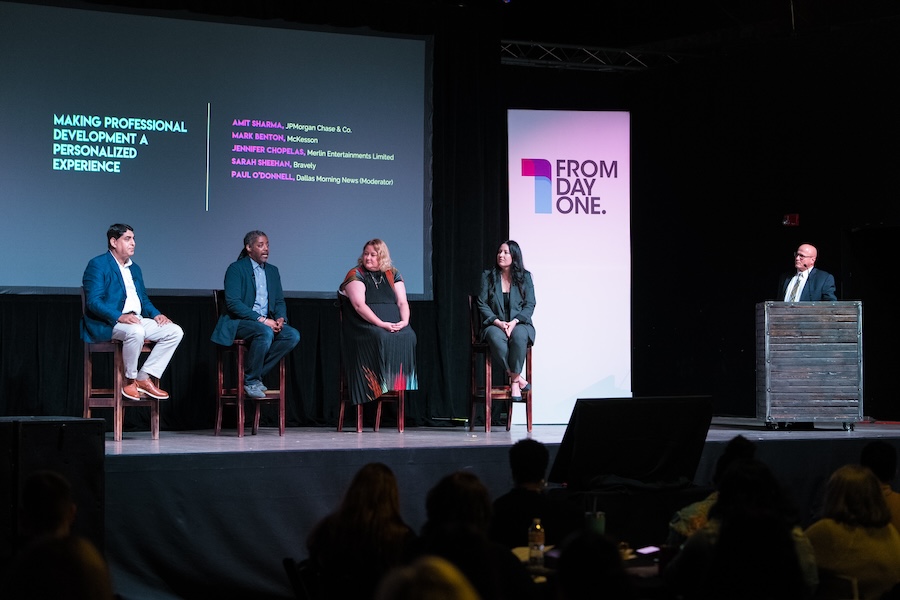Making Professional Development a Personalized Experience


Today’s workforce craves an added value experience and personal recognition, especially in the culture of hybrid and remote work. But how can businesses tailor development when everyone is so busy and in many cases spread all over?
As Bravely founder and CEO, Sarah Sheehan has learned over her career, each person is motivated by something different, and that plays a big role into how to approach professional development.
“We all struggle with different challenges as individuals, like what we’re bringing from our personal lives, and how that impacts how we show up at work.”
Sheehan was one of four panelists at From Day One’s Dallas conference. Paul O’Donnell, former business editor of the Dallas Morning News, moderated.
Development is like training a muscle that employees can use the rest of their career, Sheehan says. As a coaching company, Bravely works with employees at Zillow, Pinterest, Autodesk, and many more, of different sizes and industries.
“The results have been incredible,” she said. “95% of people say that they have had a mindset shift and feel more positive about their organization in their role, which to me is the mic-drop worthy stat.”
However, most of the tools out there lack a holistic approach. For example, within many manager training sessions, a whopping 70% of information is lost in 24 hours and 90% is gone within a week—unless it’s reinforced with post application tools, says Sheehan. “Coaching is the perfect post application tool,” she said.
Leveraging Technology and Good Managers
Panelist Mark Benton is VP of HR corporate functions at McKesson, a medical equipment and supply company of over 50,000 employees, 500 of which are on his HR team, says the biggest challenge they’re facing is building digital literacy as a tool.
“Our goal by the end of the year is to get everybody 30% more proficient in being digital in the way that they work,” he said. In essence, he’s hoping to encourage employees to use digital tools like AI and ChatGPT to augment 30% of their work day. McKesson has personalized this experience by creating its own internal version of ChatGPT.
As employees use these tools more regularly to automate what can be automated, they are developing best practices for using the digital tools, which is a skill most employees will need to have.
Another area of focus for Benton and anyone in HR is managers—specifically hiring the right people for the job and making sure expectations are clear. “Any of us here are in the lifelong pursuit of making sure that manager quality is good,” he said.

While companies should always provide personalized development for its managers, not everyone is adept at being a good manager. “Sometimes there’s just nothing we can do to save them from themselves. We can have all the great training programs, we can put all the right leadership models, we can have good performance management, and then they just don’t do it,” Benton said.
HR should do its part to be stewards of the culture, he added, offering a good example of how managers should be managing.
Encouraging Constructive Feedback
In global companies like JPMorgan Chase, panelist Amit Sharma, executive director of talent and career development experience, says that there is a lot of data available from employees. The question is, how can companies potentially leverage data for employees’ development?
Further, considering the diversity across the organization and the many markets and cultures of operation, how do we ensure consistency in our offerings and also meet different needs, where they exist?
“I think an area across the industry that we can focus more on is constructive feedback,” Sharma said. “Peer to peer constructive feedback overall I think is an area where we can do a lot more. We’re good at giving accolades. But how good are we really at giving feedback that’s constructive?”
For example, says Sharma, with all the company calls, do we seek feedback from others on the call? Ask them if we came across clearly and consistently? What could we have done differently?
Another area Sharma feels is important to help personalize employee development is networking. Reaching out to colleagues and peers who could guide them and be a one-on-one resource for learning and growth. Sharma once had a coach who advised him to make a list of several important people within the company to talk to regularly, plus several people outside of the company to talk to regularly. This helps to open doors and build relationships.
Self-Paced Learning
Panelist Jennifer Chopelas, head of HR at Merlin Entertainments, spoke about the company’s new program Ticket to Lead aimed at helping leaders build skills.
“Especially after Covid as we rebuilt our teams, what really became apparent was that we had several young managers who were trying their best but didn’t have the skillset yet,” she said.
Ticket to Lead is a six-week long global cohort with self-paced learning. People are busy, but they want professional development. Self-paced learning has been a good way to bridge the gap.
After running the pilot program, they saw 91% engagement and there was a 21% increase in their confidence.
“They also stated that 84% of them felt like their growth had been accelerated as a leader, because we really were investing in them.”
This kind of skill-building is crucial, Chopelas says, as they rely on managers to drive performance. And it’s those same managers who can help employees receive a personalized development experience. But managers must see that in company leadership.
“Our leaders need to be the ones standing up and showing all of those new skills that are required in this new workplace,” she said. “If you cannot build a connection and trust with your team, you cannot give them feedback or coach them. And that has to be the mentality. And it has to come from the top, they have to be demonstrating those qualities.”
Ultimately, they must be vulnerable, transparent, and build trust, so managers and employees will follow suit.
Carrie Snider is a Phoenix-based journalist and marketing copywriter.
The From Day One Newsletter is a monthly roundup of articles, features, and editorials on innovative ways for companies to forge stronger relationships with their employees, customers, and communities.